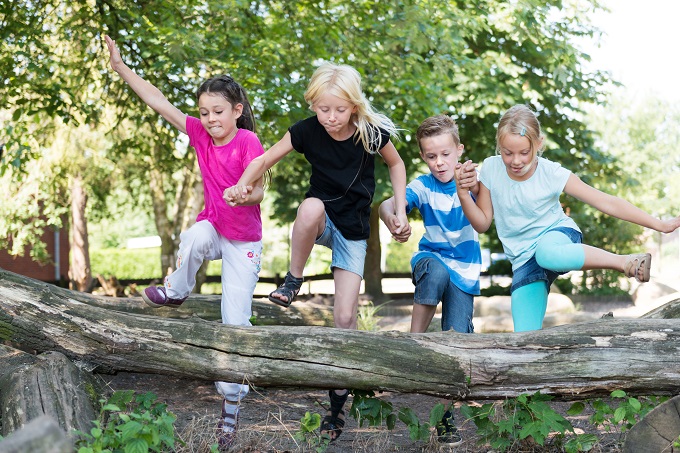
Most days, a playground cluster of tyres, barrels, fabric and ropes is a magnet for the children – and could spark future careers as architects or engineers, as the children use the materials to make different types of structures of their imagining. Everything they see is an invitation to play.
“Play that is open-ended nurtures so much more of a child’s holistic learning than instructional, teacher-driven activity for this age group,” says Assistant Principal Maria McTague.
The children don’t get just a small window of time for play, she says. “Traditionally, in early primary education, there has been a focus on cognitive skills rather than social and emotional skills before age 7. Between 3 and 7, you want to create confident, inquiring, open thinkers, with high-level thinking skills.”
Maria says child-led play engages complex thinking, expression and exploration, and also supports their transition to school.
“By engaging in a combination of self-directed and intentional teaching using invitations to play, children develop skills in persevering, concentrating and solving problems, qualities which are considered strong predictors of academic success. All areas of the curriculum are woven through the play in a cross-curricular, integrated approach.”
Year 2 student Guiliana says, “We learn by doing. You play and you can build things, and if something is hard we just do it again until we finish it.”
Maria says, “We are working to provide an environment where everyone is responsive to the children’s creativity, interests and passions. We coach, guide and comment rather than instruct in play, alongside discreet intentional teaching, and build on the learning experience the child brings with them.
“What they do in play is not adult-determined. We teach, daily, small group literacy and maths, but not at the expense of creative inquiry play,” she says.
“In play such as the building and construction of forts and huts, children will demonstrate aspects of technological process and design alongside mathematical concepts such as position, orientation and simple measurement skills. Learning involves discussion and debate alongside communicating ideas in written forms in a range of genre.
Maria says, “In fort-building they see themselves as architects – they’ll say, ‘I’m being an architect’ or ‘I’m an engineer’. It’s rich learning – not learning in isolation.
“Children have phenomenal learning abilities at this age and we need them to believe that.”
Narrative assessment and learning stories are used to track the learning in relation to the National Curriculum, making links to Te Whāriki. Every child has a learning journal and the school uses Seesaw to share achievements with parents.
St Paul’s Junior School’s approach is guided by international literature on the importance of learning and teaching through play, constructivist education theory and developmentally appropriate practices. Understanding the role of anxiety in limiting learning, such as Nathan Wallis’ research has also been important. The school has also worked with Sarah Aiono from Longworth Education.
Listen to Nathan Wallis being interviewed by Kathryn Ryan on RNZ
St Paul’s Catholic School Facebook
Value play-based learning for ages 3–7. It nurtures strong academic success in later years.
Utilise natural resources to support children’s play experiences.
Take a look at international research which provides the evidence for this approach and good ideas.
Implement changes in teaching approaches and the environment gradually, in order to sustain the changes over time.
Communicate and share the evidence for why play is important with your parent community – educate whānau on the benefits for children in learning through play.
Educators and politicians are trying to address the current teaching shortage through different policy settings.…
Melanie Webber was the president of the secondary school union PPTA Te Wehengarua from 2021…
Wait times for paediatric care is having an impact on young people’s education and the…
Home of the brave, land of the free… except when it comes to books for…
Could a gender achievement gap in maths be due to confidence? Sarah Buckley from the…
The much-delayed English draft curriculum is now out for consultation, generating discussion from teachers.
This website uses cookies.